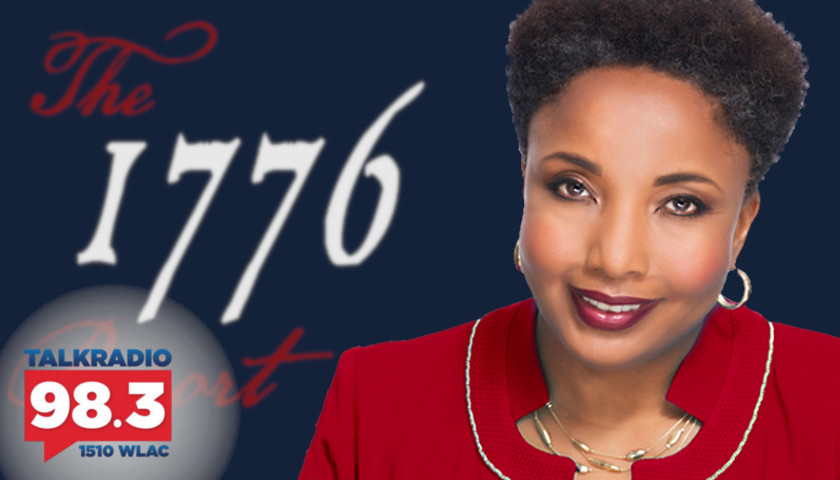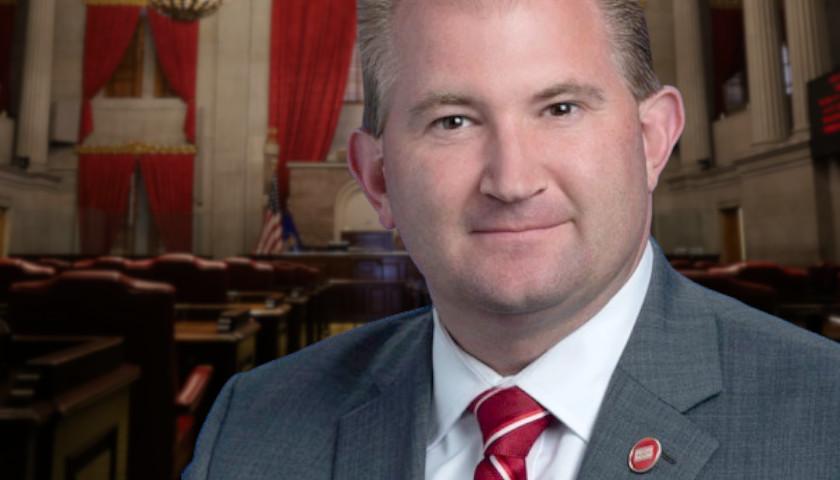Live from Music Row Tuesday morning on The Tennessee Star Report with Michael Patrick Leahy – broadcast on Nashville’s Talk Radio 98.3 and 1510 WLAC weekdays from 5:00 a.m. to 8:00 a.m. – host Leahy welcomed all-star panelist, Dr. Carol Swain on the newsmakers line to discuss her role with the 1776 Commission and their goals.
Leahy: We are joined on our newsmaker line by our good friend, all-star panelist, former Vanderbilt professor and Vice-Chairman of the 1776 Commission Carol Swain. Good morning, Carol.
Swain: Good morning, Michael. How are you today?
Leahy: I’m great. I’m great. Usually, you’re in the studio but today you’re busy and out and about talking about the 1776 Commission report that was released yesterday. I’ve read it. A fantastic statement of American principles. Tell us a little bit about the reaction to the report.
Swain: Well, it’s too early yet to know the reaction to the report but I hope is that it will be widely disseminated across the nation and that educators, in particular, will find ways to incorporate it in their curriculums. And one of the things I’m very proud of is in the appendices there is a recommendation on how to integrate it into civic education.
Leahy: That’s an outstanding element of this report. And I’m guessing you were instrumental in that portion of the report.
Swain: Well, there were certain portions of the report that I paid more attention to other than others. One would be the Civil Rights section and the slavery section. But I mean there were such great people on the commission. We had Matthew Spalding that had worked for years with The Heritage Foundation. He’s with Hillsdale College now. And then Larry Arnn the president of Hillsdale, he is the chair of the committee. And so we work very well together. And Victor Davis Hanson. He was a member of the commission. And there are others that were involved in various stages.
Leahy: Now this commission was formed by President Trump a day before the general election. And it’s expressed purpose was to provide a more accurate understanding of the nation’s founding in history through this report and through advisory roles of your commission. It’s not clear whether president-elect Joe Biden will allow the 1776 Commission to continue its work following his inauguration at noon tomorrow. If he disbands the commission, what will you do?
Swain: Well we are people that are committed to America. We love our nation and we believe that these principles are important for every American. And so I think that we will find a way to continue our work. We don’t disappear unless they start going after us as dissidents. We don’t disappear. We will continue to push forward these ideals. And the commission itself is a two-year commission, but every president has the authority to issue an executive order that would reverse the executive orders of the previous president.
Leahy: Well your commission from the President’s executive order is tasked with ensuring school compliance with Constitution Day and federal resource prioritization in support of the founding. It also functions as an advisory board to the 250th anniversary of America’s founding. That’ll be what in 2026?
Swain: Yes. And given the problems of the nation, I would think our commission would be low on the totem pole of things that the president and his advisers would consider a threat. But if Black Lives Matter and the 1619 Project are advising him, they would see it as a threat because they have their own counter-narrative about America’s founding.
And our narrative is positive we don’t say that the nation was steeped in racism and that every decision, you know was influenced by slavery. We give the true history of America and our purpose is not to cover the warts because we have not been a perfect Nation. But also to show how the Declaration of Independence influenced everything that came afterward.
Leahy: I’m looking through the report now. And by the way, you can go to The Tennessee Star at Tennesseestar.com, and read the story about the release of the report of the 1776 Commission as well as you can see the entire report. I’m looking right now at appendix four, teaching Americans about their country. And that’s the element of this report that you were really focusing on.
Swain: I was involved with all parts of the report but there were some parts that I was especially interested in. And we do have to do a better job of not just educating our young people but also our older people who have lost connection with our Constitution as well as the founding documents. And one of the things that we are really pushing is that people go back to the original document.
Not Howard Zinn’s History of America and other people that have written books. We want Americans to go back to the original source document and learn for themselves about what the founders were thinking. And we also believe that the decisions and documents that these things have to be considered in the context and spirit with which they were written.
Leahy: Now if a teacher right now is listening to this program, perhaps the teacher of social studies in eighth grade through 12th grade, what advice would you have for them to implement some of these ideas about the founding teaching about the founding to their students?
Swain: Certainly they would start with reading the 45-page document. For teachers, that’s a starting point but I would anticipate that we will have other resources moving ahead.
Leahy: Carol, are you going out on a speaking tour about this? If somebody in our listening audience, perhaps an educator or a group of educators were interested in hearing more details about implementing the recommendations of this commission report on civic education, are you available to come in and talk to those groups? And how should they proceed?
Swain: They can as long as the commission still exists and it was a creation of the Department of Education, they can reach out to us. And we have discussed taking some of the people going on the road to present at conferences. And so that’s a possibility. I’m not sure yet how that will play out. But any of the commissioners would be qualified to talk about the report and our goals and how we can implement them.
Leahy: Have you considered the possibility of going and speaking to the education committees for instance of state legislatures? It would seem to me that would be also a great place to put this message out.
Swain: You’re right. That is something that we would be willing to do. I have my own 501-c3, Be the People Project and I will certainly post a report on my website. And I may host forums just like you do with the Constitution Bee. There’s no reason why we can’t take some of those ideas and have our own forums and conferences that would be independent of anything that the president may do with the commission.
Leahy: Our mutual friend state Representative Susan Lynn will be in the studio in about 20 minutes. And if it’s okay with you, I’ll just recommend to her that she takes a copy of this report to the state House Education Committee and recommend that they invite you to testify before them.
Swain: I would love to do that. I care deeply about these issues. I know that you do and Joni Bryan and the so many people in our community that care about our Constitution and the education of our students. And I believe that we can do better in Tennessee and we can do better across the country.
Leahy: Now, what’s interesting is Carol, we’ve done a lot of reporting about various school districts that are implementing critical race theory here even in Tennessee people are trying to do that. Would you be willing to go to a school system of educators, the administration, and the school board and make a presentation to them?
Swain: There are two things going on. One is that I have my own business called Unity Training Solutions that offers an alternative to critical race theory. So I’ve already been approached by people connected with state boards of education to come and talk about critical race theory. And so I want to keep that separate from the work of the commission that has to do with educating people about the nation’s founding.
But I am an expert in that area. I think it’s very destructive for our nation. Not just for White kids, but also Black kids. And when I say White kids, the way they teach it in schools, it involves bullying of children, shaming them, and it’s not something we do in America.
Listen to the full second hour here:
– – –
Tune in weekdays from 5:00 – 8:00 a.m. to the Tennessee Star Report with Michael Patrick Leahy on Talk Radio 98.3 FM WLAC 1510. Listen online at iHeart Radio.





